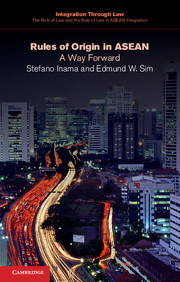
-
Select format
-
- Publisher:
- Cambridge University Press
- Publication date:
- March 2015
- February 2015
- ISBN:
- 9781316145128
- 9781107472440
- Dimensions:
- Weight & Pages:
- Dimensions:
- (218 x 138 mm)
- Weight & Pages:
- 0.65kg, 436 Pages
You may already have access via personal or institutional login
Book description
Rules of Origin in ASEAN is the first in-depth exploration of the complex rules of origin in ASEAN's trade agreements. Written by two leading practitioners, it explains with clarity the existing ASEAN Rules of Origin (RoO) practices and their administration regimes in a comparative context and provide a recommendation for reform. The ASEAN RoOs can be simplified by imparting transparency and predictability to the legal drafting, focusing on a calculation method based on value of materials and lowering the regional value content required to qualify as ASEAN origin. The administration of ASEAN RoOs can be improved by expanding the use of self-certification, moving away from document-based verification to more modern post-entry audit and trade facilitation approaches. This is a timely and important topic which will be insightful to practitioners, policymakers and businesses in understanding how commerce and trade are conducted in Southeast Asia.
Contents
Metrics
Altmetric attention score
Full text views
Full text views help Loading metrics...
Loading metrics...
* Views captured on Cambridge Core between #date#. This data will be updated every 24 hours.
Usage data cannot currently be displayed.
Accessibility standard: Unknown
Why this information is here
This section outlines the accessibility features of this content - including support for screen readers, full keyboard navigation and high-contrast display options. This may not be relevant for you.
Accessibility Information
Accessibility compliance for the PDF of this book is currently unknown and may be updated in the future.


